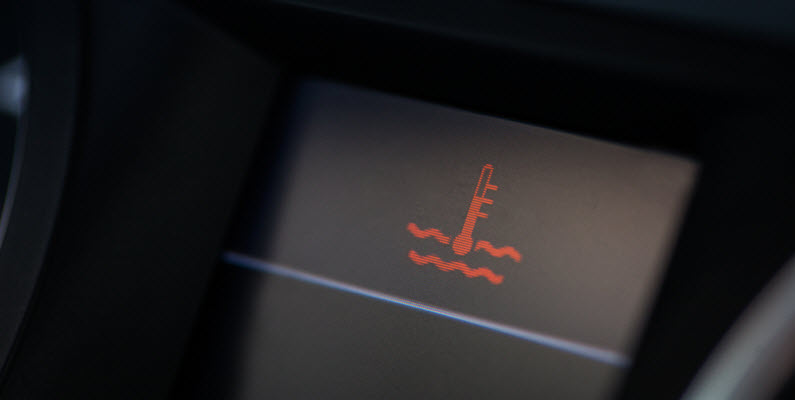Volkswagens are high-quality German-engineered vehicles that can provide years of quality service. Despite their dependability, Volkswagens can have problems that require repairs. The coolant temperature sensor is a common part that sometimes requires replacement on a Volkswagen. The coolant temperature sensor is exposed to the coolant flow inside the vehicle’s engine block or engine cylinder head, or both. This sensor constantly provides temperature information to the vehicle’s engine control unit as well as the temperature gauge.
How Does The Coolant Temperature Sensor Work?
While your Volkswagen’s engine is running, thousands of times per minute combustion events occur. Because of this combustion, heat is an engine operation byproduct. To keep the heat that is produced from ruining the engine, a liquid cooling system is incorporated in the car.
Starting with the engine, the cooling system operates with cooling passages that are in the cylinder head, intake manifold, and engine block. These passages let coolant to flow through and absorb the heat. The engine coolant temperature sensor will read the temperature of the coolant in at least one of the passages then pass that information on to the computer in the car. The computer then sends a signal to the temperature gauge for the engine, and it will let the driver know if the temperature is higher than the car’s specified range.
What Happens When The Coolant Sensor Fails?
Your vehicle will warn you of a coolant sensor that is bad. When the sensor fails, inaccurate engine will be sent to your car’s computer and it will react under false conditions. This will make the engine consume more fuel than usual, negatively impacting fuel mileage and causing the engine to expel black, sooty smoke when it is moderately or heavily accelerated.
This malfunction will cause the illumination of the check engine light, then trouble codes through the on-board diagnostic system will be stored showing engine cooling system failure, fuel delivery system failure, and exhaust and emission systems failure. Your Volkswagen might overheat since the coolant sensor might leak fluid from the engine, causing an air pocket where the engine isn’t being cooled properly.
Can I Drive My Vehicle if The Coolant Temperature Sensor Is Failing?
If you suspect the coolant temperature sensor in your vehicle is failing, you might wonder if you can continue to drive the car. You should not drive the vehicle, but instead, get it repaired right away. A faulty engine cooling system could cause your car to overheat, which will cause cylinder heads to warp, the engine block to fail, or the cylinder head gasket to fail, all of which are very expensive fixes.
If your car has engine cooling problems, especially a newer vehicle with modern engine casting materials, you could damage your car’s engine. The faulty operating conditions could cause the oxygen sensors and catalyst to foul.
How Often Do Volkswagen Engine Coolant Temperature Sensors Need To Be Replaced?
Faulty engine coolant temperature sensors are common. If you fail to properly maintain the engine cooling system as specified by the factory recommendations, that could cause the sensor to become corroded at the area where it enters the engine coolant passages. Often, the engine coolant temperature sensor must be replaced at about 100,000 miles. If you don’t properly maintain the engine cooling system, the sensor could fail much earlier.
If that happens, the check engine light will come on, and then a service technician will use a diagnostic scan tool to determine the problem. He or she will connect the scan tool through the on-board diagnostics port that is under the car’s dashboard. The information stored in your car’s computer will provide codes and that data will be compared to the conditions. If the temperature readings are not accurate, your technician will check the coolant temperature sensor. The sensor and the sensor circuit will be checked to determine if that is the problem and if replacement is warranted.
 To replace the sensor, your automotive technician will unplug the electrical connector from the sensor. A new sensor will have a sealant applied to its threads before it is inserted into the engine block or thermostat housing. If you suspect a failing engine coolant temperature sensor, you should speak to a mechanic as soon as possible.
To replace the sensor, your automotive technician will unplug the electrical connector from the sensor. A new sensor will have a sealant applied to its threads before it is inserted into the engine block or thermostat housing. If you suspect a failing engine coolant temperature sensor, you should speak to a mechanic as soon as possible.
European Motor Cars is convenient to Spring Valley, Summerlin, Henderson, North Las Vegas, and Las Vegas, NV. For the best care for your Audi, BMW, Jaguar, Land Rover, Lexus, Mercedes, Mini Cooper, Porsche, Range Rover, Volvo, or Volkswagen, schedule an appointment at European Motor Cars today.
* Volkswagen Logo image credit goes to: jetcityimage.
 3440 Spring Mountain Rd, Las Vegas, NV 89102
3440 Spring Mountain Rd, Las Vegas, NV 89102 (702) 367-7140
(702) 367-7140







